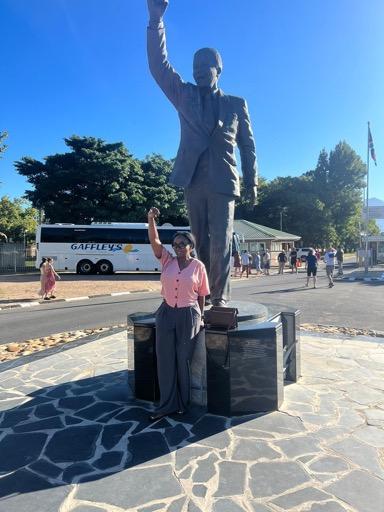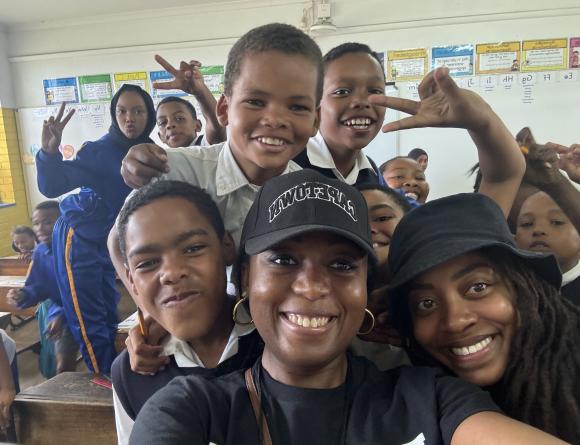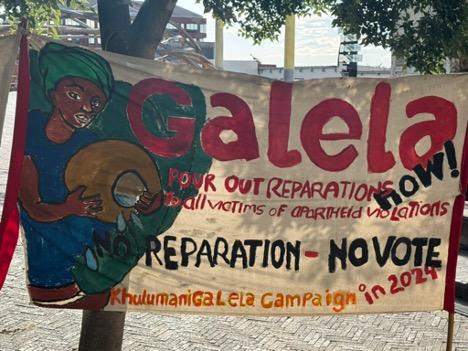
Rebecca ’Toyin Doherty `24 on the Rutgers visit to the entrance of Drakenstein Prison in Cape Town, South Africa, which has a statue of the late Nelson Mandela memorializing when he was released from prison in 1990.
Our 12-day Learning Abroad experience in South Africa was transformative in many ways. Although our experiential assignment and course readings gave us a good background of what to expect, as the popular saying goes, “Seeing is believing.” In this case, touring the museums, visiting the markets and townships, talking to people, and having many other in-person experiences truly gave me a unique insight into South Africa beyond the literature.
Education
Since the legal end of Apartheid, strides have been made around access to education. Families can now send their children to any public school in South Africa regardless of race. While this is indeed significant progress in terms of access, there are still issues around equity that persist. Schools in low-income neighborhoods are still under-resourced, which impacts the quality of education that children in those areas receive. Also, families from low-income neighborhoods cannot afford the cost of transportation to send their children to schools in high-income neighborhoods. Historically, Apartheid created a vast geographical distance between affluent and low-income neighborhoods when native South Africans were displaced. This issue has not been rectified, so there is still socioeconomic Apartheid even though the system has ended by law.
Another aspect of our learning abroad was our visit to the Klipfontein Primary School. As I looked around the school, the people there appeared to be predominantly “Coloured.” Based on South Africa’s standards, a Coloured person is biracial or multiracial, who, historically, during the Apartheid era, had to pass a “pencil test” to be recognized as a second-class citizen to Whites, while Blacks were third-class citizens. While it was such a joy to be at the school and interact with the students, faculty, and staff who were predominantly Coloured, I also wondered how the schools for “Black students” would look since a Coloured school was the only perspective we had. I was also certainly curious to see how the schools for “White students” would look. As mentioned earlier, while the law of Apartheid might have ended segregation by race, there seems to be a need for some work to be done around social and economic inclusion and integration—which is invariably still largely determined by race.

Rebecca with Lauren Bailey `24 (right) and students at Klipfontein Primary School in South Africa.
Housing
Housing in South Africa remains a problem. There is just not enough supply to meet demand. Black residents make up about 80% of the population, but the wealth of the country seems to sit within about 10% of the people, who are mostly non-Black.
When native Black South Africans were displaced decades and over a century ago, many people had to resort to living in shacks and shanty towns. Since the end of Apartheid, the government has built some new housing developments and renovated others, but a significant population of South Africans still live in shacks.
I was very disappointed to hear that the promise to return 30 percent of the land formerly owned by Black people has not been fulfilled. During Madiba Nelson Mandela's administration, the government returned 9% of the land to native Black South Africans. However, I was saddened to learn that that is where it has remained today regarding delivery and that this promise of 30% has not been realized. It brings me to question, “When and where did South Africa lose its focus? Is there still hope?”
In Langa Township, our tour guide showed us some of the new housing developments and explained how residents needed proof of income to rent an apartment. He also said that when they asked to have the opportunity for a lease-to-own, they received a “flat no” in response. I found this troubling. I thought about options any of the people who moved to these new apartments would have to actually own a home. I also wondered how people who engaged in informal markets would ever have the opportunity to show proof of income so they could move to a better living environment.
Voter Apathy
Given that the hope people once had for a better South Africa might feel deferred or unfulfilled, there seems to be a rising sense of voter apathy. At the official marketing agency of South Africa called Brand SA, one of the speakers, a government official, shared that there has been a decline in voter participation. But he seemed to pin the issue on voter awareness and registration. I wonder if they have conducted surveys and focus groups to see whether people truly lack awareness or are just disappointed by government policies that have not delivered equality to all its people. I also wonder if the speaker was being political, based on his role in government.
Contrary to the sense of optimism I observed during the government official’s speech, the Nelson Mandela Foundation’s acting director sounded quite disappointed. He mentioned that he was a part of the Truth & Reconciliation Committee (TRC) and the government had not implemented the TRC's recommendations. He shared the facts about land ownership mentioned earlier in this reflection and hopes for a better South Africa. As a civil society member, he is determined to hold the government accountable and see new ways they can cultivate social engineers to help do this work.

Protest sign at Constitution Hill in Johannesburg, South Africa.
On the issue of voter apathy, I was surprised to see a silent protest by elderly women at Constitution Hill. These women’s signs suggested “No Vote” if the government did not deliver on its promises. I was saddened to see the response to issues with the government result in “voter apathy” as opposed to voter mobilization to “vote people out.”
While respecting the social values that people uphold, I wonder whether some civil society work can be done around voter education so that people can truly understand that voting is power. As I reflect on this, I also recognize that South Africa has issues with corruption, so I wonder if that is also causing voter apathy, where people think their votes would not matter because the elections might be rigged.
As South Africa is in another election year, I am very eager to see how things turn out regarding voter participation and who becomes the hopefully elected, and not selected, leader.
My contribution would be to raise awareness through a short film (documentary) titled “The Aftermath of Apartheid: South Africa Today in 2024.”
